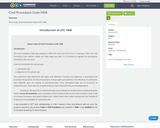
This is only brief introduction about CPC 1908.

This is only brief introduction about CPC 1908.
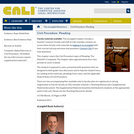
This chapter covers the Civil Procedure topic of Pleading: The Plaintiff's Complaint. The chapter takes approximately four class periods to cover in detail. The student is exposed to cases, presented with questions that are designed to both guide class discussion and to help the student focus his reading of the materials, pleadings from cases, and the applicable Federal Rules of Civil Procedure.
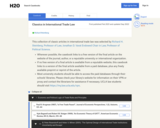
This collection of classic articles in international trade law was selected by Richard H. Steinberg, Professor of Law, Jonathan D. Varat Endowed Chair in Law, Professor of Political Science.
Wherever possible, the casebook links to a free version of the final article on the website of the journal, author, or a reputable university or international organization.If no free version of a final article is available from a reputable website, this casebook links to a version of the final article available from a paid database, plus any freely available preprint or reprint of the article. Most university students should be able to access the paid databases through their schools' libraries. Please check your library's website for information on their VPN or proxy and contact the librarians for assistance if necessary. UCLA law students should visit https://my.law.ucla.edu/vpn.
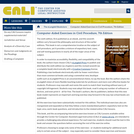
The sixth edition, first published as an ebook, and this seventh edition carry forward the philosophy and structure of the earlier editions. This book is not a comprehensive treatise on the subject of civil procedure, yet it provides a mixture of expository text, cases, and self-testing questions in nearly all of the major areas of the subject.
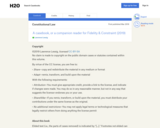
This open source casebook is a companion to my book, Fidelity & Constraint (Oxford 2019). It covers the course material of federalism, separation of powers, and the Civil War Amendments, organized into a framework for understanding how the Supreme Court has developed these doctrines. That framework is suggestive for domains beyond the scope of this casebook. The casebook can obviously be used independently of the book. Ideally, it would be used against the argument of the book, by adding material that contradicts or weakens the arguments that I have offered there. But the intent was to offer both readers of the book a way to see the source material more easily, and for users of the casebook to have a source to read more deeply. Obviously, there is a great deal of constitutional law not included within the scope of this casebook. Our hope is that others will remix this version, and add sections to cover the missing parts. If that use develops, we will find a way to display the competing versions. Our ultimate hope is to encourage a kind of casebook-authoring-competition, so that the extraordinary talent of law professors across the country could find an easier way to express itself, free of the economic constraints (and opportunities) of traditional publishing. AcknowledgmentsI am grateful to my friend Jonathan Zittrain for making the extraordinary talent of the Harvard Law Library available to me to complete this work.
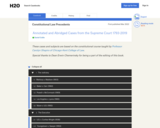
These cases and subjects are based on the constitutional course taught by Professor Carolyn Shapiro of Chicago-Kent College of Law.Special thanks to Dean Erwin Chemerinsky for being a part of the editing of this book.
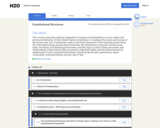
This course examines national separation of powers and federalism as core values and structural elements of the United States Constitution. It analyzes the nature and scope of the powers the U.S. Constitution vests in the three branches of the national government, the interrelationships among those branches, the distribution of powers among local, state, territorial, and federal governments, and the ways in which these structures and relationships impact democratic processes, individual rights and the advancement (or weakening) of core constitutional values, including democratic governance, equal citizenship, individual liberty and the rule of law.
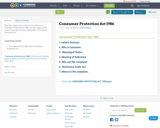
This short summery provides the key features of Consumer Protection Act 1986. the main object of this course to provides the basic information of Consumer Protection Act.
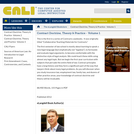
This is Volume 1 in a three volume series written for Contracts Law. The first semester of law school is mostly about learning to speak a new legal language (but emphatically not ŇlegaleseÓ), to formulate and evaluate legal arguments, to become comfortable with the distinctive style of legal analysis. We could teach these skills using almost any legal topic. But we begin the first-year curriculum with subjects that pervade the entire field of law. Contract principles have a long history and they form a significant part of the way that lawyers think about many legal problems. As you will discover when you study insurance law, employment law, family law, and dozens of other practice areas, your knowledge of contract doctrine and theory will be invaluable.
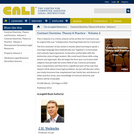
This is Volume 2 in a three volume series written for Contracts Law. The first semester of law school is mostly about learning to speak a new legal language (but emphatically not "legalese"), to formulate and evaluate legal arguments, to become comfortable with the distinctive style of legal analysis. We could teach these skills using almost any legal topic. But we begin the first-year curriculum with subjects that pervade the entire field of law. Contract principles have a long history and they form a significant part of the way that lawyers think about many legal problems. As you will discover when you study insurance law, employment law, family law, and dozens of other practice areas, your knowledge of contract doctrine and theory will be invaluable.
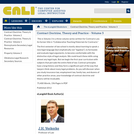
This is Volume 3 in a three volume series written for Contracts Law. Its former title is "Collaborative Teaching Materials for Contracts."
The first semester of law school is mostly about learning to speak a new legal language (but emphatically not “legalese”), to formulate and evaluate legal arguments, to become comfortable with the distinctive style of legal analysis. We could teach these skills using almost any legal topic. But we begin the first-year curriculum with subjects that pervade the entire field of law. Contract principles have a long history and they form a significant part of the way that lawyers think about many legal problems. As you will discover when you study insurance law, employment law, family law, and dozens of other practice areas, your knowledge of contract doctrine and theory will be invaluable.
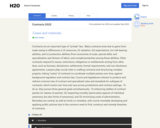
Contracts are an important type of "private" law. Many contracts arise due to gains from trade owing to differences in (i) resources, (ii) valuation, (iii) expectations, (iv) risk-bearing abilities, and (v) production abilities (from economies of scale, special skills, and specialization and division of labor), and complementarities among those abilities. Other contracts respond to issues, restrictions, obligations or entitlements arising from other laws, such as licenses, disclaimers, settlements, formal requirements, and non-disclosure agreements. Lawyers play crucial roles in crafting contracts and structuring complex projects, linking "suites" of contracts to coordinate multiple parties over time, against background regulation and contract law. Courts and legislatures interact to produce and redirect common law of contract and specialized rules and standards for subtypes of contracts, which evolve over time and vary across jurisdictions and contract settings. To do so, they pursue three general goals simultaneously: (1) enhancing welfare of contract parties (or classes of parties), (2) respecting morality (particularly aspects of individual autonomy, but also limits of autonomy), and (3) minimizing costs of administration. Remedies are central, as well as limits on remedies, with courts inevitably developing and applying public policies due to the common need to find, construct and remedy breaches of contracts.

Contracting often facilitates happiness. It enables us to do things we would otherwise be unable to do and thus to live more fully, richly, enjoyably. We enter into contracts constantly, often with little consciousness about legal consequences. Typically we become self-conscious only when a problem arises. Our course will mainly be about problems arising from contracting. It is largely an exploration of contract pathology. Before we turn to problems, however, I want to emphasize ways in which contracting is satisfying.
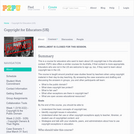
This course is for educators and learners who wants to understand how copyright affects use of learning materials, and how to use copyright to facilitate education. The course is focused on developing practical solutions. The reading won't always give these to you, its up to you to devise practical solutions based on the reading.
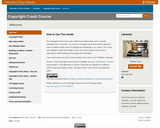
The Copyright Crash Course was created by Georgia Harper and is currently maintained by UT Libraries. The Course is arranged into several sections that allow users to explore certain areas of copyright law individually or as a group. The Course was originally created with faculty in mind, but can be used by anyone who is interested in understanding and managing their copyrights.
![Copyright History [learning module]](https://img.oercommons.org/160x134/oercommons/media/upload/materials/screenshots/materials-course-277206.png)
This interactive learning module explores the history of copyright right from the “Battle of the Book” in the 6th century, through the invention of the printing press; and up to the 1968 Australian Copyright Act. It aims to provide an understanding of why the laws were necessary and what their implications are for today’s world. After completing this module, students should be able to:
* explain the drivers for and rationale of early copyright legislation;
* understand the impact of the printing press on historical concepts of authorship and copyright legislation;
* define modern copyright; interpret Australian copyright principles;
* evaluate the suitability of current copyright and
* defend the need for copyright reform in the future.
This module can be downloaded and embedded in course sites.
Please note: a few of the supplementary/additional (non-core) resources linked to in this resource are restricted to University of South Australia staff and students. These have been clearly annotated. This module has been created using H5P software.
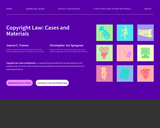
Copyright Law: Cases and Materials is a free copyright law textbook designed for a four-credit copyright course, which is what we teach at NYU School of Law. Model syllabi for four-credit and three-credit courses are available in the Faculty Resources section of this website. All faculty teaching copyright law are welcome to access the Faculty Resources, including the faculty discussion forum, by becoming a registered user of the site. To register, write us at jeanne.fromer@nyu.edu or christopher.sprigman@nyu.edu.
The textbook is made available under a Creative Commons Attribution-NonCommercial-NoDerivatives 4.0 International License. Under the terms of this license, you are free to copy and redistribute the textbook in part or whole in any format provided that (1) you do so only for non-commercial purposes, and (2) you comply with the attribution principles of the license (credit the authors, and link to the license). Note please that this license does not permit you to make modifications to the textbook or to create derivative works. That said, there are a wide variety of derivatives that we would gladly permit. If you want to make modifications to the textbook, please contact us.
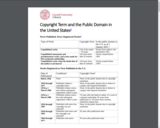
This chart is essential for anyone interested in knowing more about copyright laws in the United States. It provides term length based on date of creation, published or unpublished works, anonymous works, works made for hire, and more. It is well organized and provides a quick overview of the law as it has changed over the years in the United States.
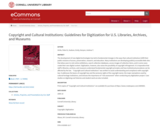
This is a full length monograph aimed at helping libraries, archives, and museums navigate copyright law involving digitization. In the course of the book, though, the authors helpfully unpack many areas of copyright law including Section 108 of the Copyright Act, Fair Use, Licensing, and Risk Management. It is a great primer on copyright law and includes many helpful key points, flowcharts and timelines.